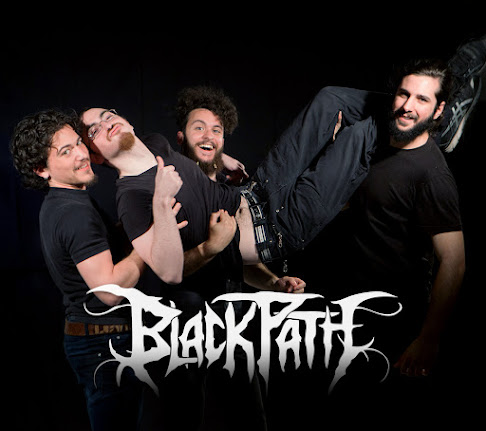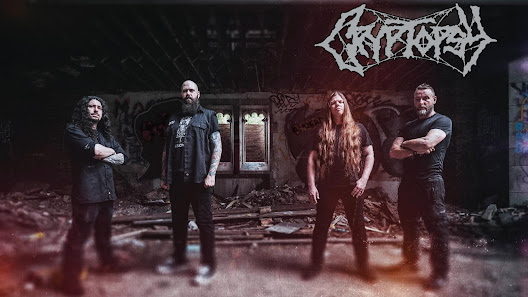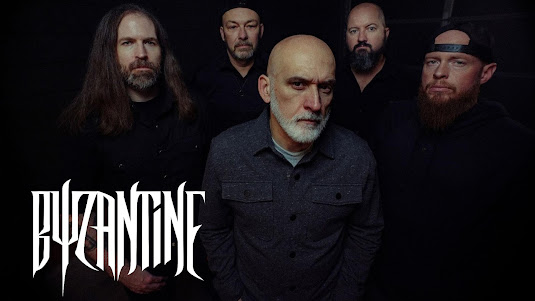Black
Path is a Greek
death metal duo formed by Kostas Mexis (vocals, bass) and Ioannis
Kaneris (guitars). Rooted in a vision of emotionally driven, modern extreme
metal, the band has steadily built a distinct identity through dense
songwriting and a refusal to compromise atmosphere for familiarity. After their
earlier works established a base of support in the underground, their second
full-length, "Of Paint And Ash," marks an ambitious evolution. The
album features several guest collaborators and instrumental flourishes that
expand the band’s sonic range while remaining tethered to death metal’s weight
and emotional intensity.
"Of
Paint And Ash" consists of nine tracks, all composed or co-composed by Mexis
and Kaneris, and explores states of inner conflict, loss, persistence,
and human emotional repetition. The lyrics—largely penned by Mexis—evoke
imagery and atmosphere inspired by dark fantasy, psychological trauma, and
endurance, drawing structural influence from the symbolic and metaphor-rich
world of “Dark Souls”.
"Of
Paint And Ash" is an ominous, layered album that avoids superficial
gestures in favor of persistent atmosphere and pacing. Its sound is cold,
architectural, and methodically constructed. The music revolves around tightly
wound riffs, bass that adds force without flooding the mix, and a rhythmic
structure that opts for flow over sudden disruption. Ioannis Kaneris’
guitar work doesn’t rely on spectacle; it serves the shape of the arrangements
and threads carefully through the bleak thematic contours.
One of the
strengths of "Of Paint And Ash" is its refusal to settle into
predictable extremes. Rather than leaning fully into old-school aggression or
modern technicality, Black Path appears committed to mood, restraint,
and a textured approach to heaviness. The result is an album that moves forward
deliberately, willing to explore sonic space without sacrificing intensity. Kostas Mexis' vocal tone is controlled and
restrained in a way that resists theatricality. Instead, his delivery feels
rooted in internal tension, matching the emotional thrust behind the lyrics,
which carry a clear sense of fatigue, distance, and confrontation with abstract
suffering.
What makes "Of Paint And Ash" notable is its use of additional textures without falling into excess. The guest instrumentation—cellos, saxophone, mandolin, harp, and analog keys—never becomes decorative. These elements feel lived-in, placed with intention. Tracks like "Izalith" and "Evermore" benefit from these textures not as ornamentation, but as structural elements shaping the mood and pacing.
Rather than
lean toward spectacle, Black Path seems to write as if each track were a
continuation of a dialogue already in progress. This lends the album a sense of
cohesion that doesn't require conceptual framing. The transitions between
tracks feel natural, not forced into false climaxes or imposed dynamic shifts.
Production-wise,
the album is grounded. It doesn’t aim for sheen or density for its own sake.
There’s space in the mix, and despite the presence of layered elements,
everything is held in equilibrium. This gives the record a worn, raw edge that
complements its emotional depth.
The vocal
contributions from Kiara Konstantinou, Iren Engel, and others
help expand the album’s emotional palette but never upstage the foundational
tone set by the core duo. Even when melodic or cleaner moments appear, they are
absorbed into the broader language of the album rather than forming a contrast
for contrast’s sake.
"Of
Paint And Ash" does not concern itself with immediacy. It is not
interested in standing out through hooks or stylistic gestures. Instead, it
operates like a slow descent—each song revealing layers of thought, fatigue,
and fragile resilience.
Score: 8.2




































